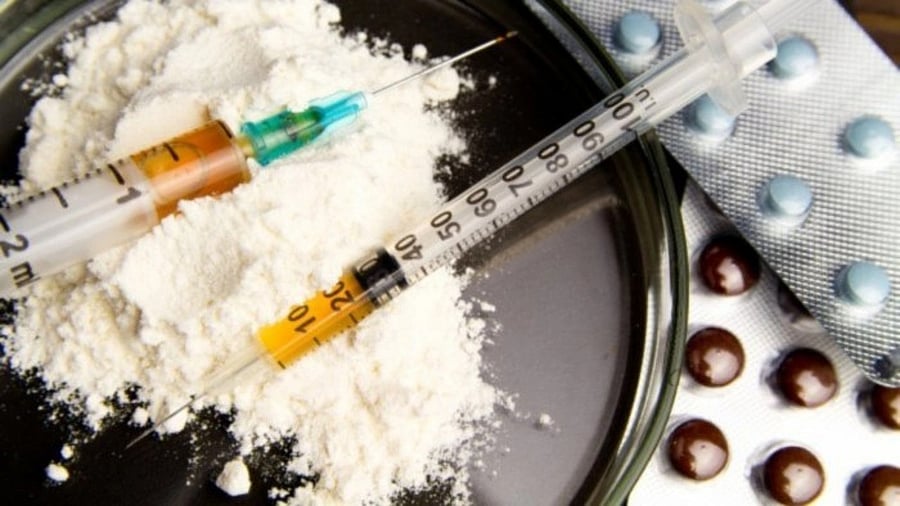
Representative image showing drugs.
Credit: iStock Photo
Dimapur: Nagaland Director General of Police (DGP) Rupin Sharma on Thursday described drug trafficking in the Northeast as both a "public health emergency" and a "national security threat", urging for a unified and technology-driven response among law enforcement agencies in the region.
Delivering the keynote address at the inaugural session of the two-day Conference of Anti-Narcotics Task Forces (ANTF) for the Northeast Region, including Sikkim and West Bengal, co-hosted by Narcotics Control Bureau (NCB) and Nagaland Police in Chumoukedima, the DGP said the North East has become the "pivot" of India's fight against drugs due to its proximity to the Golden Triangle and porous border with Myanmar.
"The India-Myanmar border, largely unfenced and under the Free Movement Regime, allows traffickers to blend with ethnic kin and cross unchecked. Drug trafficking and abuse are no longer just law-and-order issues — they are direct threats to internal security and the future of our youth," Sharma warned.
He said, according to estimates, Nagaland alone has around 1.2 lakh drug users, with heroin locally known as "Shaanflower" being the most commonly abused.
"Even if half of them consume half a gram daily, it translates to over 10,000 kilogramme of heroin per year for Nagaland alone — and roughly one lakh kilogramme for the entire Northeast," he said.
The DGP highlighted that illicit drug trade in the region fuels organised crime, insurgency, and narco-terrorism, noting that several insurgent cadres are individually involved in trafficking. "Dismantling drug cartels is synonymous with enhancing national security," he asserted.
Sharma outlined a three-pronged operational framework for the region — coordination, enforcement, and accountability.
He stressed that coordination remains the Achilles heel of India's anti-drug fight, as traffickers exploit jurisdictional gaps.
"We must move from a 'need to share' to a 'duty to share' mindset," he said, proposing joint interrogations through video conferencing within 24 hours of arrests across states.
He called for modern investigative tools — communication surveillance, darknet analysis, cryptocurrency tracking, and digital forensics — to replace traditional intelligence. Full compliance with the NIDAAN portal and real-time information sharing was also emphasised.
Sharma urged all Northeastern states to use NCORD and ANTF meetings for pre-emptive intelligence sharing, especially on traffickers, financiers, couriers, and mule accounts.
He flagged the rise of synthetic drugs like Methamphetamine and WY tablets, calling for the use of drones and satellite mapping to destroy poppy cultivation and locate hidden labs.
On financial investigation, he demanded tighter cooperation with banks and the financial intelligence unit (FIU), saying, "While banking is now 24×7, law enforcement's interface still functions 9 am to 6 pm . This must change," the DGP said.
He warned that weak prosecution remains a critical gap. "Our efforts are fruitless if legal processes fail," Sharma said, urging better documentation of conspiracy, preparation, and attempt in NDPS cases, and building shared criminal databases with biometrics and photographs accessible to all law enforcement agencies.
Among policy-level recommendations, the DGP proposed a comprehensive amendment to the NDPS Act, 1985, to reflect modern challenges and introduce graded sentencing.
He also proposed the creation of a Northeast Anti-Drug Trafficking Agency to coordinate regional operations and the establishment of dedicated Narcotics Forensic Labs in every state and deployment of mobile forensic units.
Launch of a "Nasha Mukt Bharat Helpline & Reward System" for public reporting of drug-related activities and uniform guidelines for preventive detention under PITNDPS to avoid misuse or underuse were also suggested.
The DGP also shared Nagaland Police's tech-driven initiatives — including AI-assisted lawful intercept transcription with NIT Mizoram, ANPR cameras on trafficking routes, and facial recognition systems to monitor suspect vehicles and individuals.
Calling rehabilitation "a defeat for the cartel", Sharma underscored the importance of NGO, church, and civil society engagement to address addiction. "We must integrate law enforcement with public health — a recovered addict is a success story for the community," he said.
The DGP said the conference must go beyond sharing achievements and instead focus on "sharing problems, solutions, and unresolved issues for national escalation."
"The battle against drugs is a prolonged war fought on challenging frontiers. Let us target the kingpins, strengthen inter-agency trust, and secure the future of the Northeast for a truly Drug-Free India," Sharma said.